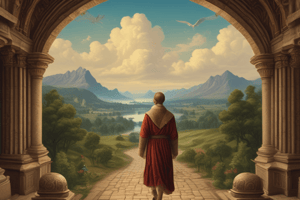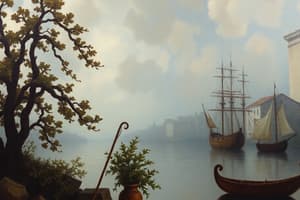Podcast
Questions and Answers
What was a major challenge faced during the Renaissance period?
What was a major challenge faced during the Renaissance period?
- Overpopulation issues
- Stability in political systems
- Rejection of new ideas by the Church (correct)
- Decline of artistic expression
How did Renaissance thinking differ from that of the Middle Ages?
How did Renaissance thinking differ from that of the Middle Ages?
- Greater focus on religious teachings
- Return to classical knowledge and valuing human capabilities (correct)
- Neglect of scientific inquiry
- Emphasis on monarchy and nobility
What economic development arose during the Renaissance that aided in cultural exchange?
What economic development arose during the Renaissance that aided in cultural exchange?
- Bartering systems among local communities
- Rise of mercantilism (correct)
- State-controlled economies
- Spread of feudalism
Which aspect of society was primarily affected by the changes of the Renaissance?
Which aspect of society was primarily affected by the changes of the Renaissance?
What was a consequence of the instability during the Renaissance?
What was a consequence of the instability during the Renaissance?
What does 'Renaissance' mean in French?
What does 'Renaissance' mean in French?
Which of the following was NOT a characteristic of the Renaissance?
Which of the following was NOT a characteristic of the Renaissance?
What played a significant role in the emergence of the Renaissance in Italy?
What played a significant role in the emergence of the Renaissance in Italy?
Who were the Medici?
Who were the Medici?
Which of the following is a key contribution of the Renaissance to literature?
Which of the following is a key contribution of the Renaissance to literature?
Which advancement is associated with the scientific progress during the Renaissance?
Which advancement is associated with the scientific progress during the Renaissance?
What was a major philosophical shift of the Renaissance?
What was a major philosophical shift of the Renaissance?
Which of the following best describes the impact of the Renaissance on European culture?
Which of the following best describes the impact of the Renaissance on European culture?
Flashcards
Renaissance
Renaissance
The Renaissance was a period of significant change in Europe, marked by a renewed interest in classical learning and a shift from religious focus to human capabilities.
Humanism
Humanism
The Renaissance was characterized by a shift away from the dominance of the Church, and a focus on human potential, creativity, and individuality.
Mercantilism
Mercantilism
Economic system based on trade and wealth accumulation, driving exploration and exchange with other regions, and changing perspectives.
Renaissance Art
Renaissance Art
Signup and view all the flashcards
Challenges of Renaissance
Challenges of Renaissance
Signup and view all the flashcards
Classicism
Classicism
Signup and view all the flashcards
Individualism
Individualism
Signup and view all the flashcards
Realism
Realism
Signup and view all the flashcards
Advancement of Science and Technology
Advancement of Science and Technology
Signup and view all the flashcards
Impact of the Renaissance
Impact of the Renaissance
Signup and view all the flashcards
Patronage of Wealthy Families
Patronage of Wealthy Families
Signup and view all the flashcards
Study Notes
Kahulugan at Konteksto ng Renaissance
- The Renaissance, meaning "rebirth" in French, was a period of extensive change in Europe, particularly Italy, from the 14th to the 17th centuries.
- It was a return to classical ideas and cultures of Greece and Rome.
- Increased interests were seen in art, architecture, literature, philosophy, and science.
- The Renaissance was not a sudden change, but a gradual process based on existing conditions.
Mga Salik na Nag-ambag sa Renaissance
- Strengthening of city-states in Italy.
- Rise of mercantilism and trade.
- Wealth and influence of wealthy families (the Medici).
- Study of classical texts from Greece and Rome.
- Invention of the printing press.
Mga Katangian ng Renaissance
- Humanism: The idea that humans are the center of the universe, instead of God. It promoted appreciation for human capabilities and potential.
- Classicism: Appreciation for the art, architecture, and literature of Greece and Rome.
- Individualism: Appreciation for the unique abilities and personality of each person.
- Realism: The pursuit of portraying things as they appear in reality.
- Advancement of Science and Technology: A new interest in studying the world, contributing to new inventions and research.
Mga Kontribusyon ng Renaissance sa Iba't-Ibang Larangan
- Arts and Architecture: Masterpieces like the works of Leonardo da Vinci, Michelangelo, and Raphael. New approaches to painting, sculpture, and architecture. Emphasis on proportion and unity.
- Literature: New works portraying human experiences. Examples include the works of William Shakespeare. Wider use of local languages and informal literature.
- Science: Period of major discoveries and inventions expanding knowledge of the world.
- Philosophy: Emergence of new ideas about life, the world, and nature.
Epekto ng Renaissance
- Widespread change in the thoughts and culture of Europe.
- Rise of new perspectives on the world and human beings.
- Spread of new ideas and viewpoints.
- Birth of modern institutions and ideas.
- Initiation of significant changes in the middle of history that led to subsequent periods in Europe.
Mga Hamong Kinaharap ng Renaissance
- Resistance from the Church to new ideas.
- Wars and conflicts between states.
- Health and poverty issues.
- Period of change and instability that contributed to the resemblance of changes and ideas.
Pagkakaiba ng Renaissance sa Gitnang Panahon
- Return to classical learning and appreciation for human potential.
- Rise of mercantilism, facilitating interactions with other places, altering wealth and views.
- Focus on arts and science, distancing from religious focus.
Konklusyon
- The Renaissance was a period of rapid change in Europe, altering art, literature, science, and philosophy.
- It was a time of growth and opening up to the classical, influential on subsequent periods in European history.
Studying That Suits You
Use AI to generate personalized quizzes and flashcards to suit your learning preferences.




